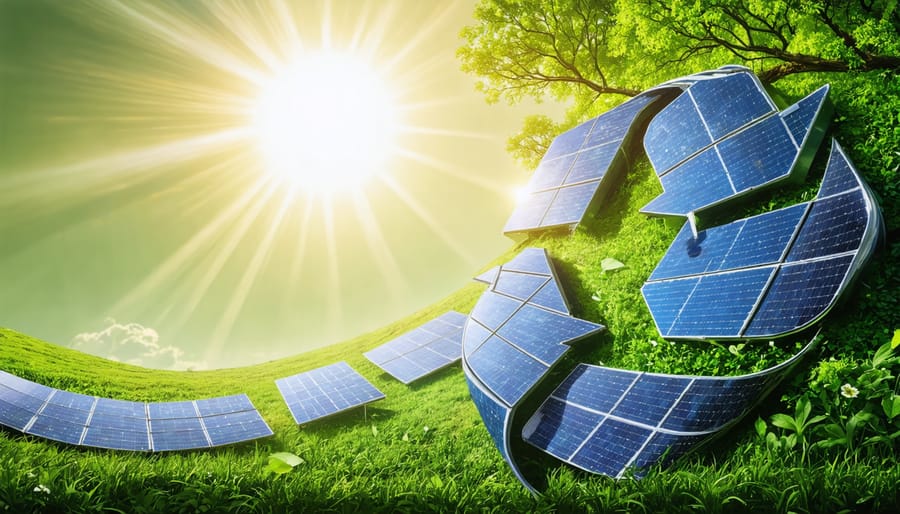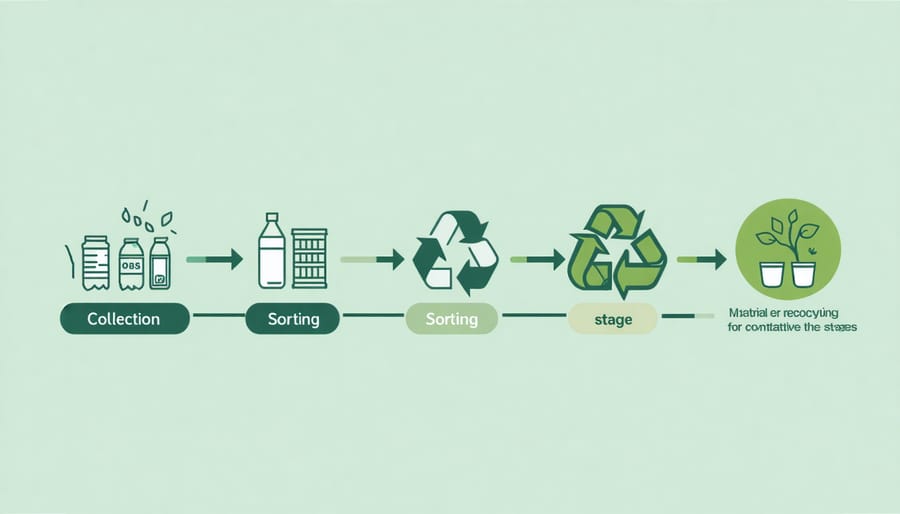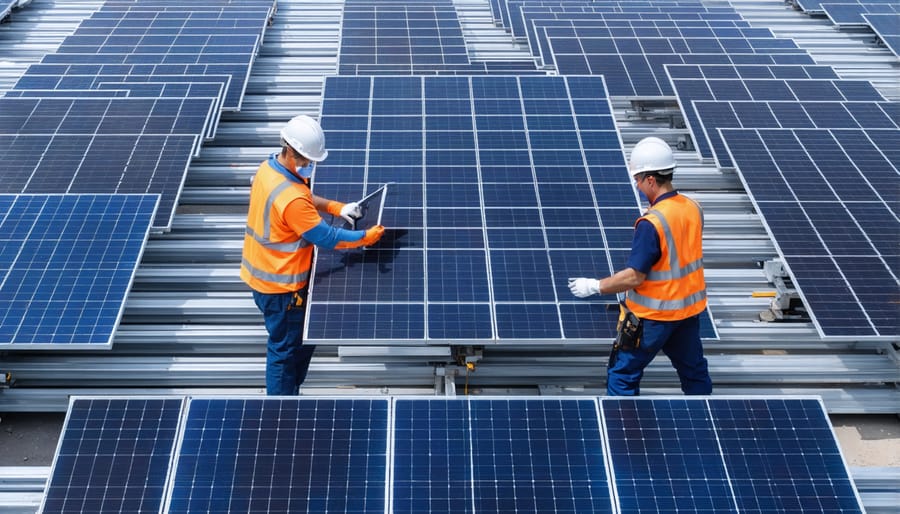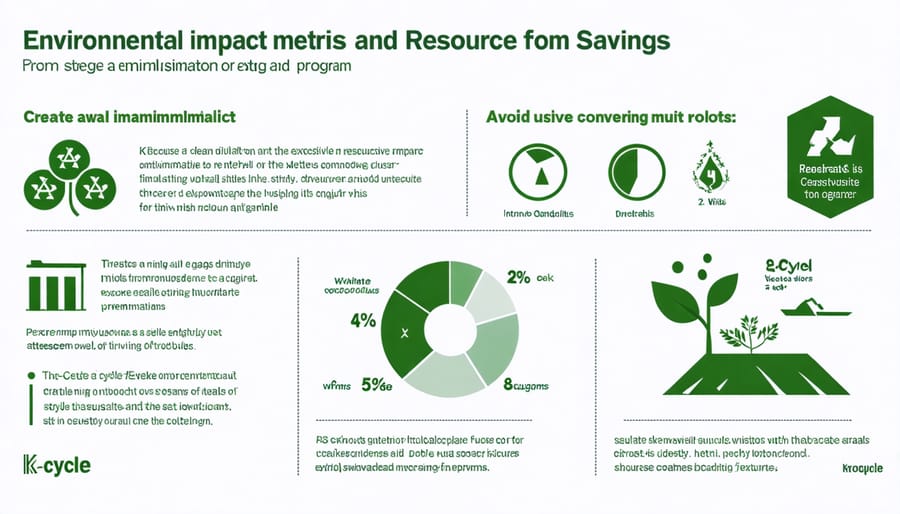How INOX Solar’s K-Cycle Program Transforms Solar Panel Recycling

Transform your solar waste management with K-cycle, Europe’s pioneering circular economy program designed to tackle solar equipment recycling challenges. This innovative system revolutionizes the traditional recycling approach by implementing a closed-loop process where 95% of solar panel components are recovered and repurposed into new manufacturing streams.
Operating across 27 EU member states, K-cycle connects manufacturers, installers, and recycling facilities through a sophisticated digital tracking platform, ensuring complete transparency and regulatory compliance. The program’s comprehensive collection network and state-of-the-art processing facilities have already diverted over 100,000 tonnes of solar waste from landfills, while creating sustainable jobs and reducing carbon emissions by an estimated 75% compared to traditional disposal methods.
For businesses and homeowners investing in solar technology, K-cycle offers a future-proof solution that transforms end-of-life management from an environmental liability into a valuable resource stream.

Understanding the K-Cycle Recycling Process
Collection and Assessment
The k-cycle recycling program begins with a systematic collection process where certified partners gather end-of-life solar panels and related equipment from installation sites across Europe. Trained technicians conduct initial on-site assessments to categorise materials and determine their recyclability potential. This preliminary evaluation helps streamline the subsequent recycling phases.
Upon arrival at designated collection centres, solar equipment undergoes comprehensive quality assessment using advanced diagnostic tools. Specialists evaluate the condition of various components, including photovoltaic cells, glass panels, aluminum frames, and electronic elements. This detailed analysis determines whether components can be refurbished for reuse or must proceed to material recovery.
The assessment process also includes detailed documentation of each item’s specifications, age, and performance history, creating a valuable database for improving future recycling efficiencies. Environmental compliance checks ensure all materials meet European waste management regulations before entering the recycling stream. This thorough evaluation phase is crucial for maximising resource recovery and ensuring the program’s sustainability goals are met while maintaining strict quality standards throughout the recycling chain.
Material Separation and Recovery
The k-cycle program employs advanced sorting technologies to efficiently separate different components of solar equipment. Initially, automated optical sorting systems identify and categorize materials based on their physical properties. This sophisticated material recovery process achieves separation rates exceeding 95% for valuable materials like silicon, silver, and aluminum.
The system utilizes mechanical separation techniques, including crushing and screening, followed by density separation in specialized flotation tanks. Magnetic separators extract ferrous metals, while eddy current separators recover non-ferrous metals. Advanced thermal processing helps separate semiconductor materials from glass components.
For polymer materials, the program implements innovative chemical separation methods that break down complex composites into their base materials. This enables the recovery of high-purity materials suitable for manufacturing new solar equipment. The recovered materials undergo rigorous quality testing to ensure they meet industry standards for reuse, maintaining the circular economy principle while reducing waste and environmental impact.


Environmental Impact and Sustainability Benefits
Resource Conservation
The k-cycle recycling program demonstrates remarkable efficiency in conserving vital raw materials through its innovative recovery processes. By systematically dismantling and processing solar panels, the program successfully recovers up to 95% of valuable materials, including silver, silicon, aluminium, and glass. This high recovery rate significantly reduces the demand for virgin resources in manufacturing new solar equipment.
For every tonne of solar panels processed through the k-cycle program, approximately 700kg of glass, 160kg of aluminium, and 35kg of silicon are recovered and reintroduced into the manufacturing cycle. These recovered materials maintain their quality and can be used repeatedly without degradation, creating a truly circular economy in the solar industry.
The program’s sophisticated sorting and treatment technologies ensure maximum material purity, making the recovered resources immediately suitable for reuse in new solar panel production. This efficient resource reclamation not only preserves natural resources but also reduces energy consumption and carbon emissions associated with raw material extraction and processing, supporting Europe’s sustainability goals while maintaining the highest quality standards in solar equipment manufacturing.
Carbon Footprint Reduction
The k-cycle recycling program demonstrates significant potential for reducing carbon emissions throughout the solar equipment lifecycle. Based on comprehensive environmental impact assessments, each tonne of solar panels recycled through the k-cycle process prevents approximately 1.2 tonnes of CO2 emissions compared to traditional disposal methods. This reduction stems from both the recovery of valuable materials and the prevention of new raw material extraction.
The program’s innovative material separation techniques ensure that up to 95% of panel components are recovered and repurposed, substantially lowering the carbon footprint associated with manufacturing new solar equipment. Energy consumption during the recycling process is optimised through advanced automation and efficient processing methods, further contributing to emissions reduction.
Studies conducted across European recycling facilities show that implementing k-cycle protocols can reduce transportation-related emissions by up to 40% through strategic facility placement and optimised logistics networks. Additionally, the program’s emphasis on local processing centres helps minimise the carbon impact of long-distance material transportation, making it an environmentally sound choice for European solar asset owners committed to sustainability goals.
European Compliance and Standards
The k-cycle recycling program maintains strict adherence to EU recycling regulations and demonstrates full compliance with the Waste Electrical and Electronic Equipment (WEEE) Directive. This comprehensive alignment ensures that all recycling processes meet or exceed European standards for environmental protection and resource recovery.
The program has achieved certification under ISO 14001:2015 for environmental management systems and ISO 9001:2015 for quality management, demonstrating its commitment to operational excellence. These certifications validate the program’s systematic approach to environmental responsibility and quality control throughout the recycling process.
Key compliance features include detailed documentation of material recovery rates, which consistently exceed the minimum 80% threshold required by EU standards. The program’s tracking system ensures complete transparency in the recycling chain, from collection to final processing, meeting all requirements for proper disposal and resource recovery.
Furthermore, the k-cycle program incorporates the latest CE marking requirements for recycling equipment and adheres to all relevant health and safety standards outlined in EN 50625 series for the treatment of waste electrical and electronic equipment. Regular audits by certified European compliance bodies ensure ongoing adherence to these standards.
The program also maintains compliance with the European Green Deal initiatives, supporting the EU’s circular economy goals through its innovative approach to material recovery and waste reduction. This alignment with EU sustainability objectives makes the k-cycle program an ideal choice for businesses seeking to meet their environmental obligations while contributing to Europe’s green transition.
Implementation for Businesses and Homeowners
Registration and Collection Process
Joining the k-cycle recycling program involves a straightforward four-step process designed for efficiency and convenience. Begin by registering your organisation through the official online portal, where you’ll provide essential details about your solar equipment and expected recycling volumes. Upon registration, you’ll receive a unique identification code and access to the digital tracking system.
Next, schedule your first collection by logging into your account and selecting your preferred date and time slot. The system allows for both regular scheduled pickups and on-demand collections, accommodating various operational needs. For large installations, our team will conduct a site assessment to determine the most efficient collection method.
During collection, our certified technicians will properly document and label all materials using the standardised European waste classification system. They’ll provide you with a digital receipt confirming the type and quantity of materials collected, which is automatically logged in your account for compliance tracking.
The final step involves verification and reporting. Through your online dashboard, you can access detailed reports of your recycling activities, including material recovery rates and environmental impact metrics. This documentation helps demonstrate compliance with EU solar waste regulations and can be used for sustainability reporting.
For businesses handling multiple sites, we offer a centralised management option that streamlines the process across different locations while maintaining individual site tracking capabilities.
Documentation and Tracking
Effective documentation and tracking form the backbone of the k-cycle recycling program, ensuring transparency and accountability throughout the entire process. The program utilises a sophisticated digital monitoring system that records each step of the recycling journey, from initial collection to final material recovery.
Participants receive unique identification codes for their recyclable materials, enabling real-time tracking through an online portal. This system generates detailed reports on material volumes, processing status, and environmental impact metrics, including CO2 emissions avoided and energy saved through recycling activities.
For businesses and industrial participants, the program provides comprehensive monthly performance reports that include:
– Material recovery rates
– Processing efficiency metrics
– Environmental impact assessments
– Compliance verification documentation
– Chain of custody certification
The monitoring system also facilitates regulatory compliance by automatically generating necessary documentation for EU waste management directives and local environmental regulations. This data-driven approach enables continuous improvement of the recycling process while providing participants with valuable insights for their sustainability reporting.
Annual audits are conducted by independent third-party organisations to verify the accuracy of tracking systems and ensure adherence to European recycling standards. These results are made available to all stakeholders, promoting transparency and trust in the program’s effectiveness.
The k-cycle recycling program represents a significant step forward in sustainable waste management, particularly within the European solar industry. By implementing this innovative system, businesses and homeowners have witnessed substantial reductions in waste disposal costs while contributing to environmental preservation. The program’s success has sparked interest across multiple sectors, leading to increased adoption rates and improved recycling infrastructure throughout Europe. Looking ahead, the k-cycle system is poised for continued growth, with upcoming technological enhancements and expanded collection networks planned for the next five years. As regulatory frameworks evolve and environmental consciousness grows, the k-cycle recycling program stands as a model for efficient, sustainable resource management, promising even greater environmental and economic benefits for future generations.
Leave a Reply